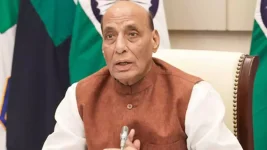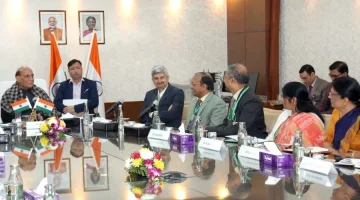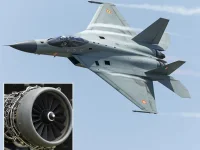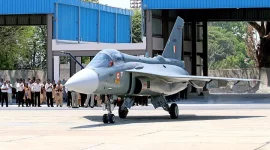- Views: 1K
- Replies: 1
Defence Minister Rajnath Singh convened a significant review meeting on May 26, 2025, with the heads of eight key Defence Public Sector Undertakings (DPSUs).
The minister directed these state-owned defence firms to boost their production capabilities and intensify focus on developing sophisticated technologies to fortify India's defence preparedness. DPSUs are government-owned corporations in India established to fulfil the defence requirements of the country.
The discussions, occurring against a backdrop of increased regional security concerns following the recent 'Operation Sindoor', underscored the vital contribution of DPSUs towards achieving self-sufficiency in defence manufacturing, a core objective of the 'Aatmanirbhar Bharat' (self-reliant India) and 'Make in India' initiatives.
These government-led programs aim to make India a global manufacturing hub and reduce import dependency, particularly in critical sectors like defence. Mr. Singh commended the DPSUs for their role in strengthening India's defence capacity, especially during the aforementioned operation, and stressed the urgent need for accelerated research and development (R&D) to address the evolving nature of modern warfare.
During the review, Minister Singh acknowledged the DPSUs' significant projected role, expecting them to account for 78% of India's targeted Rs 1.4 lakh crore defence production in the 2024-25 fiscal year. He also noted their collective presentation of an interim dividend amounting to Rs 2,138 crore to the government.
The eight undertakings present were Hindustan Aeronautics Limited (HAL), specialising in aircraft; Bharat Electronics Limited (BEL), focusing on defence electronics; Bharat Dynamics Limited (BDL), a missile and ammunition manufacturer; Mazagon Dock Shipbuilders Limited (MDL), Garden Reach Shipbuilders & Engineers (GRSE), Goa Shipyard Limited (GSL), and Hindustan Shipyard Limited (HSL), all key shipbuilding and repair entities; and Midhani, a supplier of specialised metals and alloys.
These organisations were lauded for their development of indigenous systems that were crucial during 'Operation Sindoor', a precision counter-terrorism strike executed on May 7, 2025.
Mr. Singh strongly urged the DPSUs to increase the manufacturing of advanced military platforms and to make substantial investments in R&D. This is to effectively counter emerging security threats such as unmanned aerial vehicles (drones), cyber warfare, and autonomous combat systems.
"The government remains committed to strengthening the defence industrial base and enhancing the competitiveness of DPSUs," he affirmed. He highlighted the necessity for innovation in rapidly advancing fields like artificial intelligence (AI) and electronic warfare (EW) to effectively meet changing geopolitical dynamics.
Electronic warfare involves using the electromagnetic spectrum to control the battlefield, while AI in defence refers to the use of intelligent systems for tasks like surveillance, reconnaissance, and autonomous weaponry. The minister's call for heightened indigenous capability is also seen in light of recent reports of Pakistan utilising Chinese-manufactured J-10 fighter jets and ZDK03 Airborne Warning and Control Systems (AWACS) during recent hostilities.
'Operation Sindoor', which targeted terrorist infrastructure in Pakistan and Pakistan-occupied Jammu and Kashmir (PoJK), effectively demonstrated the capabilities of India's domestically produced defence equipment.
The operation involved the use of SkyStriker loitering munitions (drones that can wait in an area before attacking) manufactured in Bengaluru, BrahMos supersonic cruise missiles, and Defence Research and Development Organisation (DRDO)-developed platforms like the Netra Mk1 AEW&C (Airborne Early Warning and Control aircraft).
These deployments showcased the DPSUs' capacity to provide effective, high-impact defence solutions. Minister Singh praised their efforts, stating that the operation's success was a "symbol of India’s political, social, and strategic will."
The Defence Minister also pointed to the recent inauguration of the BrahMos Integration and Testing Facility in Lucknow on May 11, 2025, as a significant step in India’s journey towards self-reliance in defence.
The BrahMos missile is a supersonic cruise missile that can be launched from submarines, ships, aircraft, or land. The new facility, constructed in a notable 40 months under the oversight of Uttar Pradesh Chief Minister Yogi Adityanath, is slated to produce 100 BrahMos missiles annually, thereby bolstering India's strategic deterrence.
Furthermore, Mr. Singh acknowledged the growing involvement of private sector companies, such as PTC Industries, in setting up plants for critical materials like titanium and superalloys, indicating a strengthening public-private partnership model to advance defence production.
This high-level review meeting took place in the context of persistent tensions with Pakistan, following a four-day period of conflict that concluded with a ceasefire on May 10, 2025. During this period, both nations reportedly engaged in cross-border actions, with India had neutralised Pakistani air defence systems and dismantled nine terror camps.
Minister Singh's statements during the meeting, and in earlier visits to Jammu and Kashmir, have consistently highlighted India's position of restraint coupled with robust preparedness, warning that any aggression against the nation's sovereignty would be met with "quality action."





